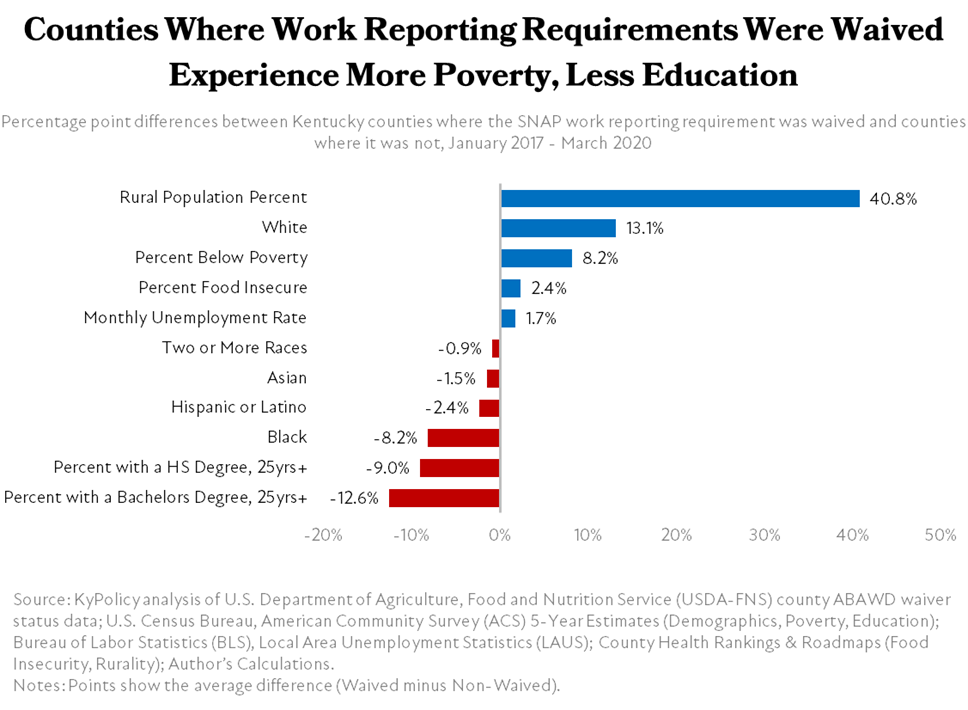Recent state and federal policy debates around the Supplemental Nutrition Assistance Program (SNAP) have frequently returned to the requirement that certain adults report work hours in order to receive food assistance. On average, over 60,000 Kentuckians must meet this requirement each month unless they live in an area where that requirement is waived. Kentucky’s experience with these waivers, as well as the literature on SNAP work reporting requirements in general, suggests that exempting Kentuckians from the complex reporting rules – through waiving areas and by offering individual exemptions when appropriate – would help alleviate hunger, and have no meaningful negative impact on the broader labor market.
You can find a full PDF of the report here.
How SNAP work reporting rules work
Federal law limits SNAP eligibility for Able-Bodied Adults Without Dependents (ABAWDs) – typically those aged 18-54 with no dependent children – to just three months of food assistance within a three-year period unless they work or participate in a qualifying training or volunteer activity for at least 80 hours per month.
Many people subject to these rules face significant barriers to finding and keeping steady employment. These challenges can include limited education, lack of reliable transportation, unstable local job markets, or health problems that impact their ability to work but may not meet SNAP’s formal disability criteria. For many, SNAP assistance, which provided an average of just $6.16 per-person per-day in fiscal year 2025, is the only resource available to help them afford groceries.
Recent federal changes under the Fiscal Responsibility Act of 2023 expanded the age range subject to these rules and limited states’ flexibility regarding discretionary work-requirement exemptions, reducing the number of exemptions allowed and eliminating the ability to carry them over year-to-year, making state-level policy decisions even more critical. Kentucky currently uses federal authority to request waivers from these requirements in counties with high unemployment or insufficient jobs, protecting many residents in economically distressed areas (as of fiscal year 2025, all but three counties are waived). Historically, Kentucky has cited an unemployment rate significantly higher than the national average as its qualifying indicator for waiving areas of the state from the work-reporting rules.
However, Kentucky state law (KRS § 205.178) prevents the state from using another important federal option: a limited number of annual “discretionary exemptions.” Typically, states can use these exemptions (recently reduced federally from 15% to 8% of the affected caseload) to extend assistance beyond the three months in three years limitation for people in non-waived counties who face barriers and are at risk of losing SNAP. This restriction in state law leaves people vulnerable if they live in an area that doesn’t qualify for a county-wide waiver but still face personal hurdles or the realities of unstable low-wage work.
Preponderance of studies show work reporting requirements harm Kentuckians without improving employment
While these reporting requirements are often presented as a way to encourage employment, a large body of research shows they primarily cut off essential food assistance without leading to meaningful, long-term gains in employment or earnings. Instead, these policies increase food insecurity, worsen health outcomes and disproportionately harm vulnerable Kentuckians. Taking away food assistance often makes existing challenges harder to overcome and penalizes people struggling in difficult circumstances rather than helping them find stable work.
The evidence showing that ABAWD work requirements are ineffective and harmful is substantial:
- Participation Plummets: Studies using detailed administrative records consistently show these requirements cause large numbers of people to lose SNAP assistance. One Virginia study found a 53% drop in participation among affected adults within 18 months. Other multi-state analyses confirm similar significant declines. The magnitude of this effect underscores the significant impact these requirements have on access to food assistance for low-income adults.
- Employment and Earnings Don’t Improve: Rigorous research finds little to no significant or lasting increase in employment rates or earnings as a result of these mandates. These studies suggest instead that broader economic conditions, rather than the requirement itself, are the main drivers of employment trends. Many SNAP participants already work in the low-wage labor market, which is often characterized by job instability, fluctuating hours, and limited opportunities for advancement. People frequently turn to SNAP after losing a job or because they face other barriers to work; the program helps them regain stability without slipping into deeper poverty or food insecurity. SNAP helps cushion the impact of a volatile labor market; it doesn’t cause the volatility and cannot fix it alone.
- Hardship Increases: Losing SNAP assistance leads to increased food insecurity, forcing families to rely more heavily on emergency food pantries and potentially make difficult trade-offs that harm nutrition and health. Studies also link the loss of assistance due to these requirements to worse physical and mental health outcomes and increased financial strain, including higher levels of debt.
- Inequitable Impacts: The negative consequences fall hardest on those already facing significant barriers. Research indicates steeper drops in SNAP participation (meaning more people losing assistance) among Black and Hispanic people, those with chronic health conditions (even if not formally classified as disabled by SNAP), people experiencing homelessness, and those with extremely low income or limited work histories.
For a more comprehensive chart of the literature, see table at the end.
Kentucky’s experience with waiving SNAP work reporting shows the waivers were needed
Kentucky’s own data mirrors national findings. Pre-COVID pandemic analysis shows counties that received waivers consistently faced greater socioeconomic challenges, indicating waivers as currently implemented effectively target areas of need. On average, these areas were more rural, impoverished, food insecure, and had a higher unemployment rate, while also being less educated or racially/ethnically diverse. Additionally (as shown in the full report), areas where the requirement was waived had a far lower weekly wage on average than non-waived counties, suggesting not only that was it more difficult to find employment but the wages offered for available jobs were far lower – making SNAP all the more important to purchase food and offset other expenses.

Additionally, Kentucky’s extensive SNAP Employment and Training pilot in eight high-poverty counties from 2016-2019 resulted only in modest, short-term employment gains without significantly boosting earnings or reducing food insecurity, and was not found to be cost-effective. This suggests that even expanded training programs struggle to overcome limited job opportunities in distressed regions.
Kentucky should combine the county waivers with discretionary exemptions
Given the evidence that work requirements cause harm without improving employment, Kentucky should adopt a dual strategy: continue seeking county-level waivers for high-unemployment areas and utilize the state’s federally authorized discretionary exemptions. This approach represents the best path forward because it:
- Maximizes participation: County waivers shield large numbers of Kentuckians from losing essential food assistance in regions where job opportunities are scarce.
- Protects vulnerable people: Discretionary exemptions offer a vital safety net for people in non-waived counties who face specific barriers—like unstable work hours or health issues—and risk losing SNAP. This targeted approach promotes fairness by helping those who might otherwise fall through the cracks.
- Minimizes cost: This strategy avoids the significant negative fiscal impacts of universal work-requirement enforcement or the high costs of statewide E&T expansion, representing a low fiscal cost to the state.
- Pragmatic: It leverages existing federal flexibilities to mitigate the harshest impacts of a flawed federal policy.
Implementation requires legislative action
Critically, Kentucky cannot use discretionary exemptions due to restrictive language in KRS § 205.178. The General Assembly would need to amend this statute to explicitly authorize the Cabinet for Health and Family Services (CHFS) to use these 8% exemptions.
Once authorized, CHFS, through the Department for Community-Based Services, should establish a simple, accessible process for caseworkers to grant these exemptions as a stopgap measure for those at imminent risk of losing SNAP in non-waived counties. This change does not require creating a large new bureaucracy but rather can be administered as a targeted mechanism to prevent unnecessary hardship.
Adopting this dual strategy—county waivers plus discretionary exemptions—is the most effective and equitable way for Kentucky to navigate federal SNAP work requirements, protect vulnerable residents from food insecurity, and ensure state policy is grounded in evidence rather than punitive measures that fail to promote economic self-sufficiency.
Summary of Peer-Reviewed Studies of SNAP Work Requirements





